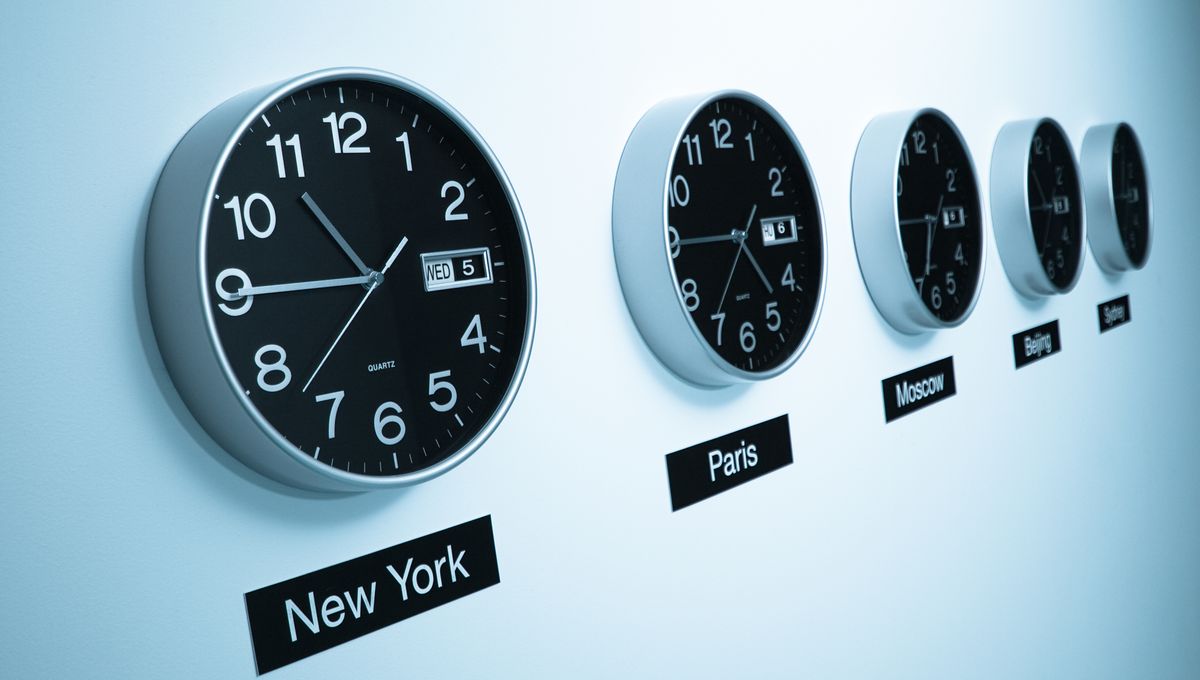
Unless we take action, global timekeeping could be heading toward a major problem that will upset everything from computer networks to financial markets. The culprit, oddly enough, is melting polar ice caused by climate change.
The world uses Coordinated Universal Time (UTC) to ensure there’s a consistent, standardized measure of time across the world to facilitate communication, navigation, scientific research, commerce, and so on.
This measure of time is computed using data from about 450 atomic clocks, super-accurate time-keeping devices that use the ultrastable “vibrations” of atoms to measure time. Annoyingly, it doesn’t perfectly align with astronomical time, which is based on Earth’s rotation.
The rotation of our planet is a few milliseconds longer than a day defined by atomic clocks, plus the speed of Earth’s spin can vary due to many factors. To account for this, leap seconds are added to UTC every few years or so to ensure it’s synchronized with astronomical time.
For instance, strange and somewhat unknown changes within Earth’s mostly liquid core and solid mantle have accelerated Earth’s rotation in recent decades, but this has been accounted for by the addition of leap seconds.
Now, new forces are starting to emerge that could meddle with Earth’s rotational speed even more and upset global timekeeping.
Duncan Carr Agnew, a geophysicist at the Scripps Institution of Oceanography at the University of California San Diego, has recently been studying the rotation of Earth and how it’s being impacted by melting polar ice.
Due to climate change, ice caps in Greenland and Antarctica are melting at such a scale that they are changing the shape of the planet and decreasing its angular velocity more rapidly than before.
Because of Earth’s slowing spin, Agnew argues that the UTC will need to receive a negative leap second – ie. a minute with just 59 seconds – some time around 2029.
“Even a few years ago, the expectation was that leap seconds would always be positive, and happen more and more often. But if you look at changes in the Earth’s rotation, which is the reason for leap seconds, and break down what causes these changes, it looks like a negative one is quite likely,” Agnew explained in a statement.
“One second doesn’t sound like much, but in today’s interconnected world, getting the time wrong could lead to huge problems,” he added.
Regardless of climate change, it’s likely that changes to Earth’s liquid core alone may have necessitated a negative leap second by 2026. However, Agnew’s calculations show that changes in polar ice mass have delayed this eventuality by another three years to 2029. In other words, climate change is already affecting global timekeeping.
If the negative leap second isn’t added, it’s possible that global timekeeping will become unsynchronized, causing massive disruptions to computer systems and telecommunications networks.
The press release for the research suggests the situation could lead to a problem akin to Y2K bug panic – but is that a real concern?
In the late 1990s, there was intense paranoia that computer systems around the globe would crash in the new millennium because computers were not prepared to format or store calendar data in and after the year 2000. People envisioned a computer-induced apocalypse in which planes fell out of the sky, bank accounts were reset to zero, and nuclear weapons would spontaneously launch. As you have no doubt guessed, the fears were hugely overblown, and very few errors were actually reported.
Given how badly the predictions of the Y2K scare went, it would be naive to throw out wild guesses about how this new problem might unfold. That said, it’s something that many scientists are starting to ponder.
“A negative leap second has never been added or tested, so the problems it could create are without precedent. Metrologists around the world are following the unfolding discussion attentively, with the view to avoiding any unnecessary risks,” Dr Patrizia Tavella, Director of the Time Department at the International Bureau of Weights and Measures, writes in a commentary article about the study.
Dr Tavella adds that the task of introducing the negative leap second – and coordinating the effort worldwide – would be a “formidable” one.
The new study is published in the journal Nature.
Source Link: Earth's Changing Shape May Cause A Global Timekeeping Crisis